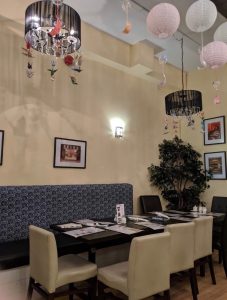Business owners: Making hard decisions on reopenings
Business owners: Making hard decisions on reopenings
By Irish Mae Silvestre
The Philippine Reporter
With the sight of patios bustling with diners, one could be forgiven for thinking it’s business as usual. As Ontario rolls out phase three of re-openings, people are embracing the move that’s slowly giving daily life some semblance of normality.
And with the province’s number of COVID-19 cases continuing to trend downwards, many are cautiously venturing outdoors.
However, with a virus still looming large and the race for a vaccine still ongoing, fears of a second wave are all too real.
“I’ve definitely been on top of things in terms of reading the news and also reading news about our neighbours down south,” said Sasha Ortega, who manages Tala, a Filipino restaurant in downtown Toronto. “Whenever they’ve reopened, they’ve gotten a second wave and that’s just something we didn’t want to risk, we didn’t want to ride that wave.”

Tala’s takeout or binalot remains popular
(Photo provided)
Tala has the rare distinction of launching during a time when other restaurants were either closing or scrambling to switch their service to takeout. Since opening their doors, the restaurant has never had dine-in services. Instead, the restaurant, known for their kamayan boxes, relies on deliveries and pick up orders. For now, according to Ortega, they’ll be keeping it that way.
Even with strict safety guidelines, she said that the industry has “little cracks everywhere.” Ortega said she always reminds staff not to come in if they’re feeling even slightly unwell.
“Restaurants aren’t obligated to let the public know if someone in their staff is affected,” she explained.
“It’s just a scary situation,” she added. “My parents aren’t getting any younger and my mom [Tala’s chef Cathy] is here every single day. When we announced we won’t be opening, for phase three, customers reached out telling us they support us, and it was a smart decision. We’re really thankful for that.”

Isabella’s Boutique Restaurant
(Photo provided)
Getting creative and being prepared
Cecilia Noon is no stranger to disasters. The owner of Isabella’s Boutique Restaurant, which serves Japanese fusion cuisine, has lived through the earthquake and the Fukushima nuclear disaster when she lived in the area. She said she very quickly learned to adapt and deal with tough situations.
Her staff, the majority of whom were Japanese, decided to return home. And with the help of their accountant, Noon said they qualified for a government loan. So, when the restaurant had to switch their operations to takeout, Noon focused on her business’ strengths.
“Two years ago, we decided to add mochi donuts,” she recalled. “By 2019, we wanted to up production to be more productive, so we bought the machine and changed the recipe.”
Now, they sell thousands of donuts weekly at their location and through collaborations with restaurants like Tala. So far, their Filipino-inspired mochi donuts such as Milo, banana cue, mango float, palitaw, ube, macapuno and yema have been a hit. According to Ortega, Tala’s supply of Noon’s donuts sells out almost daily.
Despite the challenges, Noon said that it’s allowed her to slow down and spend more time with her family, while also growing their business.
“My husband and I are a team and we’re used to rolling with the punches,” she said. “But I feel like we are doing it. It’s hard work but we love what we’re doing.”
Comments (0)